Regular pokies gambling in Australia, 2022
National Gambling Trends Study
October 2023
Nancy Greer, Rebecca Jenkinson, Brian Vandenberg, Kei Sakata
Download Research snapshot
Overview
This research summary presents findings from a 2022 survey of Australian adults (n = 1,016) who gambled on pokies (also referred to as poker machines or electronic gaming machines (EGMs)) on a regular basis (at least fortnightly). The survey examined gambling behaviour and experiences in the past 12 months.
Key messages
-
Four out of five participants (81.9%) who gambled regularly on pokies were classified as being at risk of gambling harm, with younger age groups (18-34 years; 89.2%) at highest risk.
-
Participants spent around $1,019 per month (median) across all types of gambling, including $400 per month on pokies, with around 1 in 5 (19.4%) reporting using credit cards to gamble.
-
The time participants spent on pokies at their most recent gambling session was 2 hours (median) and more than half (52.7%) reported they had gambled alone.
-
Probable serious mental illness was identified in 7% of regular pokies gamblers.
-
Only a minority (less than 1 in 10, 9.2%) of regular pokies gamblers reported seeking help for gambling harm (in the past year). Embarrassment was the most common reason reported for not seeking help (65.4%).
-
Participants classified as being at risk of gambling harm:
- spent more on pokies per month ($500 compared to $125 not at risk) and across all gambling activities ($1,011 compared to $353 not at risk)
- withdrew money multiple times during their most recent session of gambling on pokies (27% compared to 1.6% not at risk)
- were more likely to gamble in the late-night hours of midnight to 8 am during their most recent pokies gambling session (23.9% compared to 8.2% not at risk)
- met criteria for probable serious mental illness (8.2% compared to 2.2% not at risk)
- sought help in the past year for gambling harm (11.2% compared to 0% not at risk) or wanted to seek help but didn't (21.5% compared to 0% not at risk).
About the National Gambling Trends Study
Purpose
This is the first release of the National Gambling Trends Study (NGTS) findings, which will be produced annually by the Australian Gambling Research Centre (AGRC) at the Australian Institute of Family Studies (AIFS). The aim of the NGTS is to present timely information on recent trends, emerging issues and possible future directions in gambling participation and related harms in Australia. The information is relevant for gambling policy makers and regulators, service providers, researchers and the broader community. A long-term goal of the NGTS is to support the development and implementation of evidence-based approaches to prevent and reduce gambling-related harm in Australia.
Methods
The NGTS uses mixed-methods research, drawing on data from different sources to increase robustness and reliability. The current release is based on a consumer survey conducted online July-November 2022 with people who gambled on pokies (poker machines or electronic gaming machines (EGMs)) on a regular basis (at least fortnightly) (N = 1,016).
Reports
This research summary is 1 of 3 published for the 2022 edition of the NGTS. The full suite includes:
- Regular pokies gambling in Australia, 2022
- Regular online betting in Australia, 2022
- Consumer views on emerging trends and future directions for gambling in Australia, 2022.
Sample characteristics
A convenience sample of Australian adults who gambled regularly (at least fortnightly in the previous 3 months) on pokies was recruited during July-November 2022 with an online survey covering their demographic characteristics, gambling behaviour (frequency, spend, mode, location, payment methods used, risks and harm), most recent pokies gambling session, alcohol use and smoking, health and wellbeing, help seeking, and use of harm minimisation tools. Median survey duration was 17 minutes.
| Number of survey participants | % (N = 1,016) |
|---|---|
| State/Territory | |
| New South Wales | 37.8 |
| Victoria | 23.1 |
| Queensland | 21.5 |
| South Australia | 10.2 |
| Western Australia | 3.1 |
| Tasmania | 1.8 |
| Australian Capital Territory | 1.4 |
| Northern Territory | 1.1 |
| Age | |
| 18-24 years | 9.3 |
| 25-34 years | 23.4 |
| 35-49 years | 32.5 |
| 50-59 years | 15.5 |
| 60-64 years | 6.0 |
| 65+ years | 13.4 |
| Mean age (years) | 44 |
| Gender | |
| Men | 52.8 |
| Women | 46.7 |
| Non-binary | 0.3 |
| Not answered | 0.3 |
| Birthplace, ancestry and language | |
| Australian born | 82.5 |
| Aboriginal and/or Torres Strait Islander | 7.2 |
| Speaks language other than English at home | 13.3 |
| Relationship and household status | |
| In a relationship/married/de facto | 57.9 |
| Lives with other people | 81.1 |
| Location | |
| Lives in a major city | 76.5 |
| Lives outside major city | 23.5 |
| Education, employment and income | |
| Bachelor's degree or higher | 30.9 |
| Currently studying | 21.7 |
| Currently employed | 71.4 |
| Median weekly income (AUD$) | 1,000-1,249 |
Gambling participation
Past-year gambling
Among Australian adults who reported gambling regularly on pokies, the majority reported also gambling on lotto/lottery games (81.2%), instant scratch tickets ('scratchies') (67.4%), horse racing (62.7%), sports events (55.9%) and keno (53.4%; see Figure 1). Nearly half reported also gambling on casino table games (46.9%) and greyhound racing (44.1%). Around one-third reported also gambling on harness racing (35.8%) and poker (33.7%). Overall, those participating in regular pokies gambling reported an average of 7 different gambling activities in the past year.
For the 56% of regular pokies gamblers who reported gambling on sports events, the most popular sporting codes gambled on included: the National Ruby League (NRL) (47.2%), Australian Rules Football (AFL) (45.2%), soccer (25.2%), tennis (22.0%) and cricket and basketball (both at 20.2%).
Figure 1: Past-year gambling participation by type of gambling activity among regular pokies gamblers
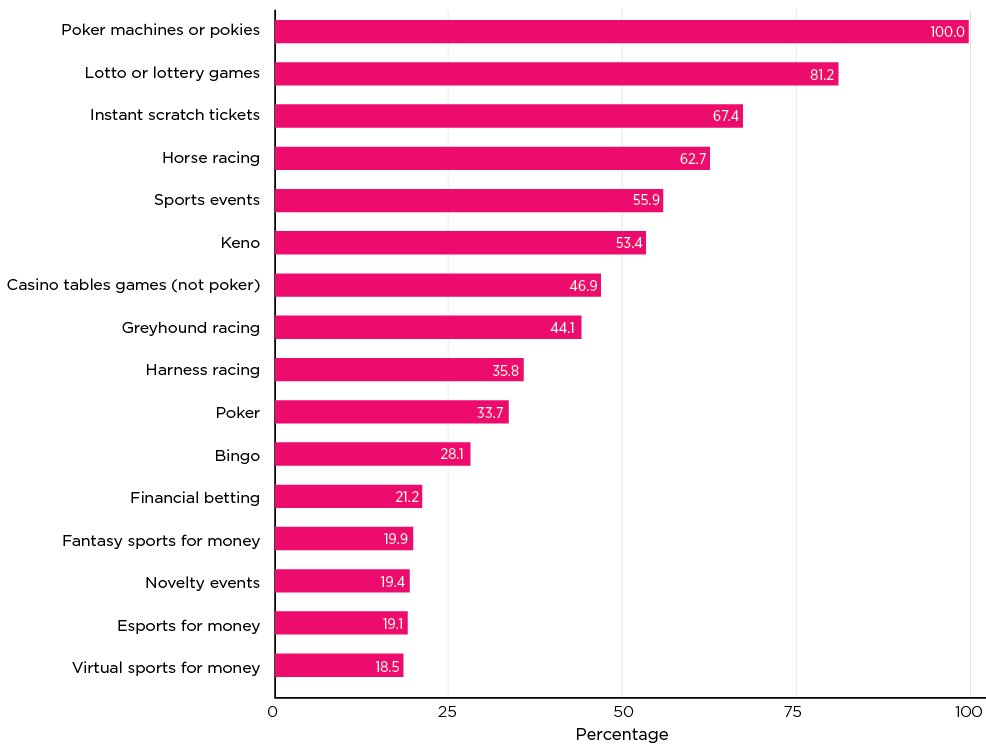
Note: Percentages do not add to 100.0% as could gamble on one or more gambling activity in the past 12 months.
Gambling initiation
Around 2 out of 5 pokies gamblers reported that their first experience of gambling with real money was on pokies (39.3%), while for around 1 in 5 it was horse racing (22.4%), and for nearly 1 in 10 it was lotto/lottery games (9.4%).
Gambling participation by age and gender
Among regular pokies gamblers, past year participation in gambling activities was proportionately higher for those aged 18-34 years compared to those aged 55+ years, with the exception of keno and lotto/lottery games. For example, younger adults (aged 18-34 years) who reported gambling regularly on pokies were the age group most likely to report also gambling on sports events (75.3%) and casino table games (64.8%; compared to 28% and 17.9% respectively for those aged 55+ years).
Men were more likely than women to report participating in most gambling activities, including, for example, gambling on horse racing (72.8% vs 52.1%) and sports events (67% vs 44.1%).
Frequent gambling
A large proportion of those surveyed reported gambling on pokies more often than fortnightly, with around 3 in 5 (61.6%) reporting that they gamble at least weekly on pokies (see Figure 2). Around one-third (37.2%) reported also gambling at least weekly on lotto/lottery games, around one-quarter (24.5%) on sports events, and around one-fifth (22.4%) on horse racing. On average, those who gambled regularly on pokies reported participating in 3 different types of gambling activities at least weekly.
Figure 2: At least weekly gambling participation by type of gambling activity among regular pokies gamblers
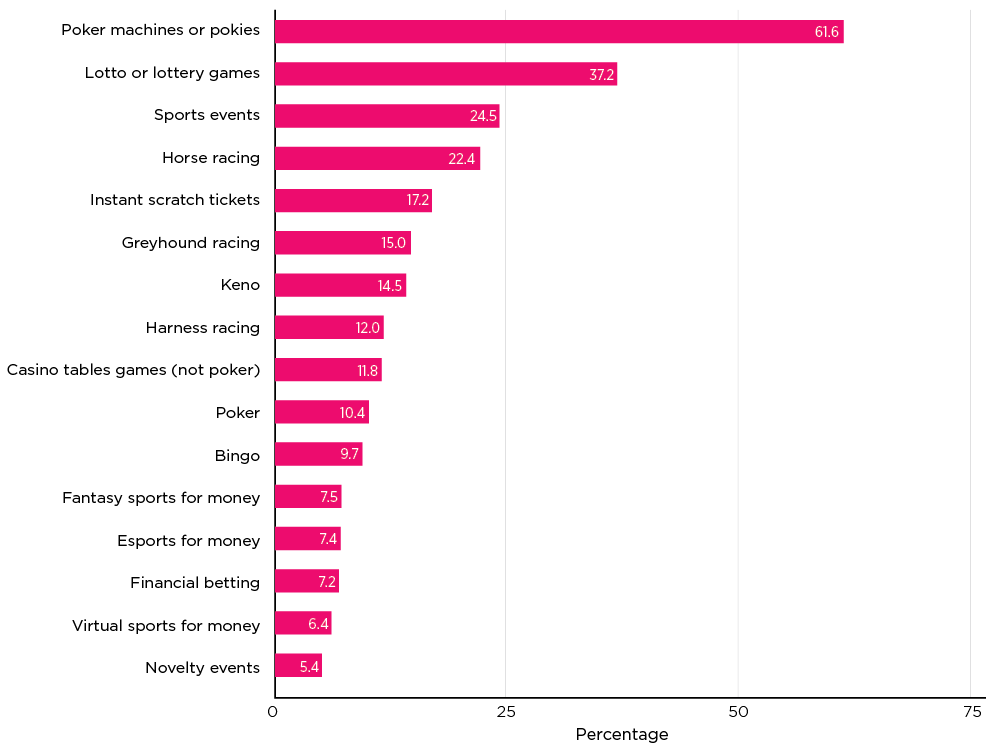
Note: Percentages do not add to 100.0% as participants could gamble on one or more gambling activity at least weekly in the past 12 months.
Session length and time of day gambling
Participants were asked a range of questions focused on their most recent pokies gambling session. The estimated median length of participants' most recent pokies session was 2 hours. The majority of sessions lasted more than 1 hour, with 6.3% of pokies gamblers' sessions lasting for more than 24 hours (see Figure 3).
Figure 3: Length of most recent pokies gambling session among regular pokies gamblers
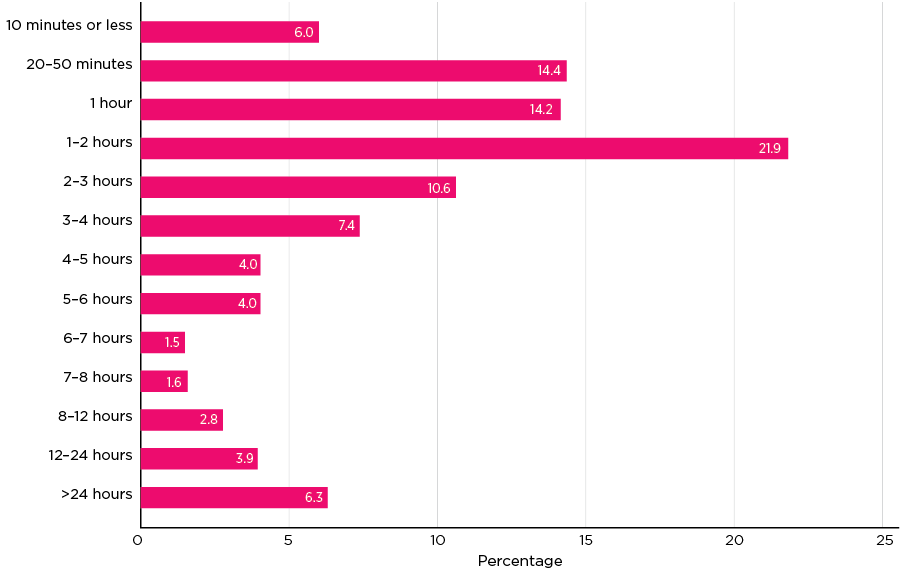
Notes: Sample n = 1,016. Data missing for 1.5% of sample (n = 15).
In Australia, licensed venues generally operate areas with pokies into the early morning hours, although this varies by state and territory. This was reflected in times of day consumers most recently gambled on the pokies. More than half of regular pokies gamblers reported that their most recent session on the pokies was in the evening between 6 pm and 9 pm (53.1%; see Figure 4). Large proportions also reported that their most recent session was either side of this, between 3 pm and 6 pm (40%), or between 9 pm and midnight (39%). Just under one-fifth reported gambling past midnight and into the next day (21.1%).
Figure 4: Times of day of most recent pokies gambling session among regular pokies gamblers

Notes: Sample n = 1,016. Data missing for 1.5% of sample (n = 15). Percentages do not add to 100.0% as gambling could have taken place across multiple time of day categories.
Gambling expenditure and setting
Estimated monthly expenditure
The estimated expenditure on gambling across all gambling activities combined (excluding financial betting) by regular pokies gamblers was $1,019 per month on average (median). However, estimated expenditure differed across gambling activities. For example, the highest estimated median monthly expenditure was reported for gambling on pokies ($400), followed by gambling on sports events ($50), lotto/lottery games ($50), and horse racing ($45; see Figure 5).
Expenditure on gambling also differed by gender and age. For example, men reported a slightly higher estimated median total monthly expenditure on gambling compared to women ($883 vs $876), with the gender differences largest for gambling expenditure on sports events ($100 vs $15) and horse racing ($58 vs $19). Keno was the only activity where women reported higher estimated median monthly expenditure compared to men ($20 vs $10).
Being younger was generally associated with higher median monthly expenditure on gambling activities, with the exception of horse and harness racing, lotto/lottery games and keno. Monthly expenditure on all gambling activities was highest for participants aged 18-34 years ($1,453), followed by those aged 35-54 years ($1,029) and 55+ years ($680). Expenditure across age groups also varied slightly by gambling activity. For example, estimated expenditure on pokies among those aged 18-34 years was $500 per month, followed by $400 among those aged 35-54 and 55+ years. Expenditure on sports betting was highest among those aged 18-34 years at $80 per month, followed by those aged 35-54 years ($50 per month) and 55+ years ($40 per month). Older age groups spent more per month gambling on lotto/lottery games ($72 among those aged 55+ years, $50 among those aged 35-54 years) compared to the youngest age group ($35 among those aged 18-34 years).
Figure 5: Estimated median monthly expenditure by regular pokies gamblers on each type of gambling activity
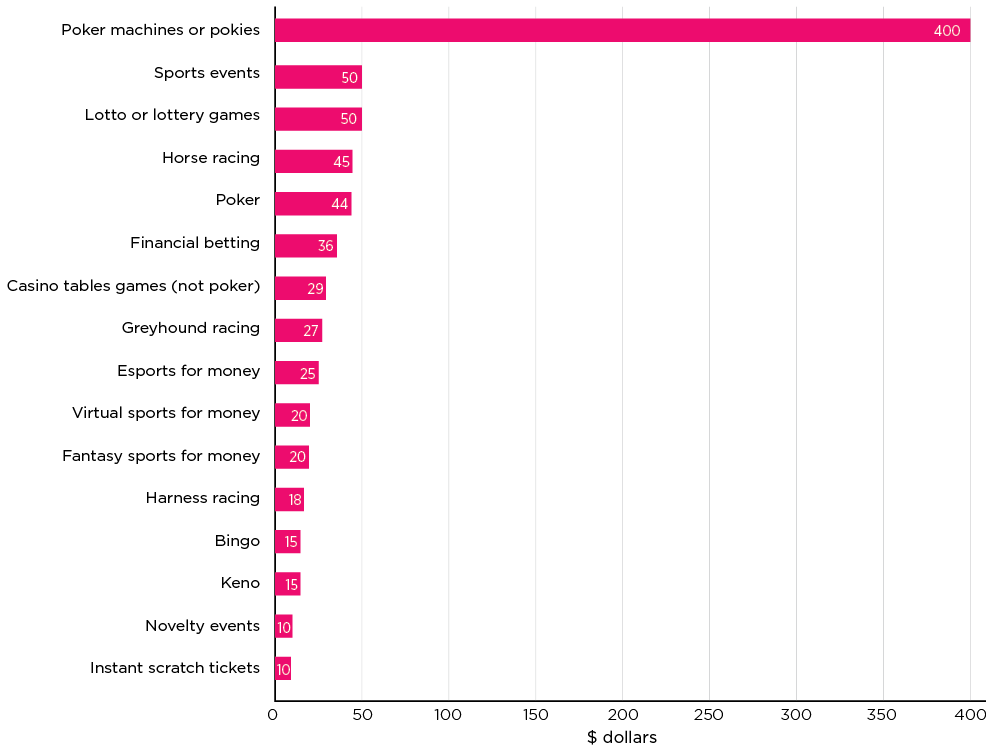
Notes: Monthly expenditure per activity was calculated using gambling frequency and reported expenditure on a typical day. The Figure shows expenditure for 15 types of gambling activities (financial betting not included).
Payment methods
A variety of gambling payment methods was reported by regular pokies gamblers for any type of gambling (see Figure 6). Non-credit payment methods were most commonly used, with 4 out of 5 (82.8%) using cash payments for gambling, and more than half (51.9%) using debit cards. However, around 1 in 5 regular pokies gamblers reported using credit cards to pay for gambling (19.4%). A higher proportion of men reported using credit cards for gambling (22.8%) compared to women (15.6%).
Figure 6: Gambling payment methods used by regular pokies gamblers

Notes: Percentages do not add to 100.0% as participants could have used multiple types of payment method for gambling.
Expenditure at most recent pokies session
More than one-quarter of regular pokies gamblers reported gambling mainly on one-cent machines ($0.01 per spin) at their most recent session (26.6%), though credit size varied. The most common maximum per spin spend on pokies was either one dollar (25.7%) or five dollars (23.3%).
Nearly half of regular pokies gamblers reported withdrawing money from an ATM/EFTPOS facility for gambling on pokies on the day of their most recent session (48.3%), and around 1 in 5 (22.4%) did so more than once. For that session, the median amount withdrawn to spend on pokies was $200.
Around two-thirds of regular pokies gamblers reported setting maximum spend limits for their most recent pokies session (67%). Of those setting a spend limit this included: making a mental note to spend up to a set amount (60.8%), only taking/withdrawing a set amount of cash to spend (35.5%), setting themselves maximum spend limits via the pokies or their account (13.7%) or setting maximum spend limits via their personal bank/cash app (2.9%). Of those who set a maximum spend limit on pokies for their most recent session, the median limit set was $100.
The median estimated total expenditure at their most recent session reported by regular pokies gamblers was $140. One in five (20.4%) regular pokies gamblers reported that they broke even (20.4%) or finished ahead (won money) (23.7%) at their most recent pokies session. However, half (50.3%) reported they finished behind (lost money).
Gambling locations
The most common locations for pokies gambling reported by regular pokies gamblers were pokies venues/clubs (66.4%) and hotels/pubs (60%). Casinos were also a common location for the pokies, reported by almost one-third of regular EGM gamblers (31%).
Online gambling on pokies (e.g. online slots) was also prevalent, despite these products being illegal in Australia. Around 1 in 6 regular pokies gamblers reported that they use online pokies (17.4%). Gambling on online pokies was more common among those in younger age groups (18-34 and 35-54 years) than the oldest age group (55+ years).
Gambling alone or with others
The findings indicated that gambling on pokies is slightly more likely to be an isolated activity than a social one, with 52.7% of regular pokies gamblers reporting gambling on their own at their most recent pokies gambling session. However, around 1 in 5 reported gambling while being with a spouse/partner (23.1%) or with friends/colleagues (19%), and around 1 in 10 with a family member/relative (9.1%).
Men were more likely to report gambling alone during their most recent pokies gambling session (57.5%) compared to women (46.8%), while women were more likely to report gambling with their spouse/partner or a family member/relative (28.3%) than men (18.8%; see Figure 7).
Younger pokies gamblers (aged 18-34 years) were more likely to report being with friends/colleagues during their most recent pokies gambling session (27.1%) compared to older adults aged 55+ years (10.4%). Whereas those aged 55+ years were more likely to gamble alone during their last pokies session (57.8%) than younger pokies gamblers aged 18-34 years (44.6%).
Figure 7: Others present (by gender) with regular pokies gamblers during their most recent pokies gambling session
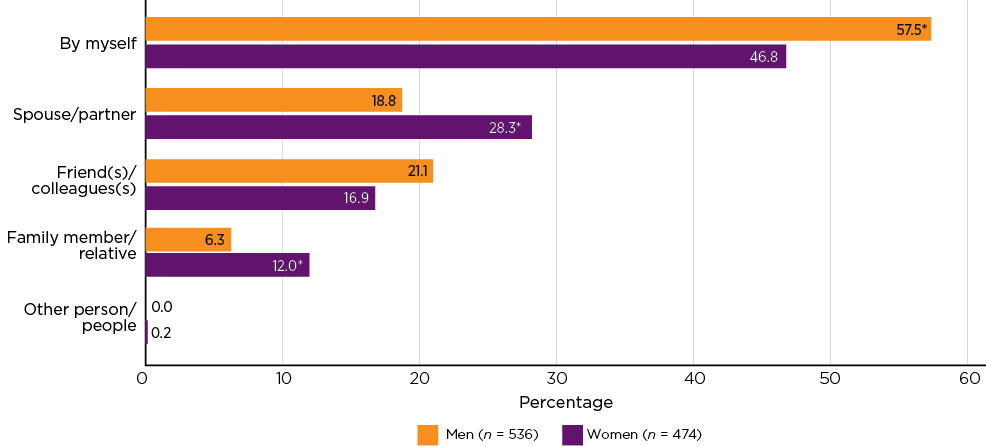
Notes: *Significantly different at p < .05 level. Those who identify with 'non-binary' were excluded from the analysis due to the small sample size.
Legal and illegal online gambling accounts
Almost two-thirds (64.4%) of regular pokies gamblers reported past-year gambling with an online betting account/s. Around one-quarter (27%) reported having 1 online betting account, around 1 in 5 (18.9%) had 2 accounts, and around 1 in 5 (18.5%) had 3 or more accounts.
One in six (16.1%) of those who reported gambling with an online betting account reported using an offshore (illegal) online betting service provider. This was reflected in the large proportions who reported gambling online on activities that are prohibited within Australia, such as online pokies (slots) (29.7%), online casino-style games (13.7%), and online in-play betting on sports events (12.4%).
Although a majority (63.8%) of regular pokies gamblers said they had not gambled using offshore (illegal) online betting accounts, 1 in 5 (20.2%) reported being unsure whether the online account/s they had used were operated by offshore (illegal) online betting providers.
At-risk gambling and experiences of gambling-related harm
Prevalence of at-risk gambling
Among Australian adults who gambled regularly on pokies, more than three-quarters (81.9%) met the criteria for at-risk gambling (low-risk, moderate-risk and high-risk/'problem' gambling combined), based on Ferris and Wynne's (2001) Problem Gambling Severity Index (PGSI; see Figure 8). Almost half (45.1%) met the criteria for high-risk gambling.
Figure 8: Classification of Australian adults who gambled regularly on pokies according to the Problem Gambling Severity Index (PGSI)

Notes: At-risk gambling during the past 12 months was assessed using the 9-item Problem Gambling Severity Index (PGSI; Ferris & Wynne, 2001). Respondents were grouped into 4 categories based on their scores: non-problem gambling (0), low-risk gambling (1-2), moderate-risk gambling (3-7) and high-risk/'problem' gambling (8-27). Respondents scoring 1+ may be classified as being at some risk of, or already experiencing, gambling problems.
Gender, age and gambling frequency differences in at-risk gambling
Although all age groups had high levels of at-risk gambling, there was a slightly higher prevalence of at-risk gambling among younger regular pokies gamblers (aged 18-34 years), with more than 4 out of 5 of this age group classified as at risk (89.2%), compared to those aged 35-54 years (82% at risk) or 55+ years (72.8%; see Figure 9). For men and women the prevalence of at-risk gambling was similar (83.2% and 80.2% respectively) but for weekly pokies gamblers the prevalence of at-risk gambling was considerably higher than it was for fortnightly pokies gamblers (86.9% compared to 73.8%, respectively).
Figure 9: Age, gender and gambling frequency of regular pokies gamblers by at-risk gambling status

Notes: Respondents scoring 1+ on the PGSI are classified as being at some risk of, or already experiencing, gambling harm; respondents scoring 0 on the PGSI are classified as not at risk of gambling harm. Those who identified as 'non-binary' were excluded from the analysis due to the small sample size. *Significantly different at p < .05 level.
Differences in gambling behaviours for at-risk pokies gamblers
The intensity of gambling behaviours of pokies gamblers at risk of gambling harm (PGSI = 1+) was higher than those not at risk (PGSI = 0; see Table 2 and Table 4 Dashboard), as shown by:
- higher frequency gambling (at least weekly) on pokies, sports events, greyhound racing, harness racing, casino table games and poker
- higher total weekly expenditure on all gambling activities (median $200 at-risk; $50 not at-risk)
- higher estimated monthly expenditure on pokies (median $500 at-risk; $125 not at-risk)
- more likely to use credit cards, cash advance by credit card and buy now pay later as payment methods for gambling
- having on average a higher number of online wagering accounts and being more likely to use an illegal offshore online wagering account
- in their most recent pokies session: higher total expenditure, more likely to withdraw money at ATM/EFTPOS facility for pokies more than once, longer session length, gambled in early hours (midnight-10 am), gambled alone, session was spontaneous (as opposed to planned), were affected by illicit drugs, experienced financial problems as a result and were less likely to set a spend/time limit on their session.
| Gambling behaviours | Not at-risk pokies gamblers (n = 184) | At-risk pokies gamblers (n = 832) |
|---|---|---|
| Estimated monthly expenditure (median AUD$) | ||
| Poker machines or pokies | $125 | $500* |
| Lotto or lottery games | $50 | $50 |
| Horse racing | $23 | $50 |
| Sports events | $20 | $50 |
| Poker | $20 | $50 |
| Casino table games (not poker) | $14 | $50* |
| Greyhound racing | $11 | $30 |
| Harness racing | $10 | $20 |
| Keno | $10 | $15 |
| Instant scratch tickets | $6 | $10 |
| Underage gambling (<18 years) | ||
| First gambled with money underage | 12.0% | 14.7% |
| First gambled at least fortnightly while underage | 3.3% | 3.2% |
| Last pokies session | ||
| Total expenditure (median AUD$) | $50 | $200* |
| Withdrew money more than once from ATM/EFTPOS facility | 1.6% | 27.0%* |
| Session length (median minutes) | 60 | 120* |
| Gambled on pokies between: | ||
| midnight and 4 am | 8.2% | 21.8%* |
| 4 am and 7 am | 6.0% | 14.1%* |
| 7 am and 10 am | 6.0% | 13.8%* |
| 10 am and midday | 15.8% | 23.1% |
| midday and 3pm | 32.1% | 37.6% |
| 3 pm and 6 pm | 29.3% | 42.3%* |
| 6 pm and 9 pm | 49.5% | 54.0% |
| 9 pm and midnight | 34.8% | 39.9% |
| Midnight and 8 am | 8.2% | 23.9%* |
| Gambled alone | 37.5% | 56.0%* |
| Gambled with spouse/partner | 35.9%* | 20.3% |
| Gambled with friends/colleagues | 21.7% | 18.4% |
| Session that day was spontaneous | 31.5% | 46.8%* |
| Consumed alcohol (before, while or after session) | 45.7% | 48.1% |
| Smoked cigarettes/tobacco or vaped nicotine | 27.7% | 48.1% |
| Affected by illicit drugs | 2.2% | 9.0%* |
| Session resulted in experiencing financial problems | 0.5% | 21.9%* |
| Set a spend and/or time limit | 77.7%* | 64.7% |
| Spend limit set (median AUD$) | $50 | $100* |
Notes: Respondents scoring 1+ on the PGSI are classified as being at some risk of, or already experiencing, gambling harm; respondents scoring 0 on the PGSI are classified as not at-risk of gambling harm. *Significantly different at p < .05 level between not at-risk and at-risk pokies gamblers.
Experiences of gambling-related harms
More than 7 in 10 (71.8%) of regular pokies gamblers reported experiencing at least 1 of 10 potential gambling-related harm in the past year, based on the Short Gambling Harms Screen (SGHS; see Table 3). The most prevalent gambling-related harms reported were a reduction in available spending money, a reduction in savings and having regrets about gambling.
The likelihood of experiencing at least one gambling-related harm in the past year was very high among those classified as being at risk on the PGSI (84.3%). Notably, also around 1 in 6 of those gambling on pokies and not at risk (15.8%) reported experiencing at least one gambling-related harm in the past year.
| Type of gambling-related harm experienced | Total pokies gamblers ( N = 1,016) % | Not at-risk pokies gamblers ( n = 184) % | At-risk pokies gamblers ( n = 832) % |
|---|---|---|---|
| A reduction in your available spending money | 54.2 | 7.1 | 64.7* |
| A reduction in your savings | 52.4 | 4.9 | 62.9* |
| Had regrets that made you feel sorry about your gambling | 47.4 | 2.2 | 57.5* |
| Had less spending on recreational expenses such as eating out, going to movies or other entertainment | 45.7 | 5.4 | 54.6* |
| Felt ashamed of your gambling | 42.1 | 1.1 | 51.2* |
| Felt like a failure | 40.9 | 1.1 | 49.8* |
| Felt distressed about your gambling | 39.1 | 1.1 | 47.5* |
| Spent less time with people you care about | 36.5 | 1.6 | 44.2* |
| Increased credit card debt | 22.6 | 0.5 | 27.5* |
| Sold personal items | 21.6 | 0.5 | 26.2* |
| Experienced one or more harms (out of 10) | 71.8 | 15.8 | 84.3* |
Notes: Experience of gambling harms was measured using the Short Gambling Harms Screen (SGHS), which is a 10-item assessment of individuals' experience of harms caused by gambling (Browne, Goodwin, & Rockloff, 2018). Respondents scoring 1+ on the PGSI are classified as being at some risk of, or already experiencing, gambling harm; respondents scoring 0 on the PGSI are classified as not at-risk of gambling harm. *Significantly different at p < .05 level between not at-risk and at-risk pokies gamblers.
Help seeking and use of harm minimisation tools
Help seeking by pokies gamblers
There was a low rate of help seeking for gambling harm among regular pokies gamblers. Only around 1 in 10 (9.2%) reported they had sought help, while around 1 in 6 (17.6%) reported that they wanted to seek help but had not done so. Around two-thirds (66.1%) reported that they didn't need help. The most common reason given for not seeking help was feeling embarrassed (65.4%). All pokies gamblers seeking help or wanting to seek help were at risk of gambling harm (PGSI = 1+; see Table 4 Dashboard).
The main reasons given for seeking help (n = 93) included:
- financial problems (64.5%)
- relationship problems (29.0%)
- health problems (26.9%)
- work or study problems (18.3%)
- being urged by someone (16.1%)
- legal problems (4.3%).
The main types of help sought (n = 93) included:
- called a helpline (e.g. Gambler's Help, Lifeline) (38.7%)
- browsed a gambling help-related website or forum (31.2%)
- enrolled in a self-exclusion program (26.9%)
- sought help from a community organisation (e.g. sporting club, church group, charity organisation) (22.6%)
- sought help from a financial counsellor or lawyer (15.1%)
- sought help from gambling venue or wagering operator staff (17.2%).
Consumer protection tools and other actions used by pokies gamblers
Harm minimisation options were used by only a minority of pokies gamblers, with those at risk most likely not to use any options. Only around one-third of regular pokies gamblers (36.9%) reported taking any harm minimisation actions in the past year to limit the amount of time or money spent gambling at a venue (see Figure 10). The most common harm minimisation action reported was taking breaks during a gambling session (13%), followed by setting a deposit limit (10.2%) and setting a loss limit (10%).
Pokies gamblers at risk of gambling harm (PGSI = 1+) were more likely than those not at risk of gambling harm (PGSI = 0) to use any of the actions to control their gambling spend/time at a venue and individually engage in each action (see Table 4 Dashboard).
Figure 10: Actions taken in past year by regular pokies gamblers to try to control the amount of money or time spent gambling at a venue
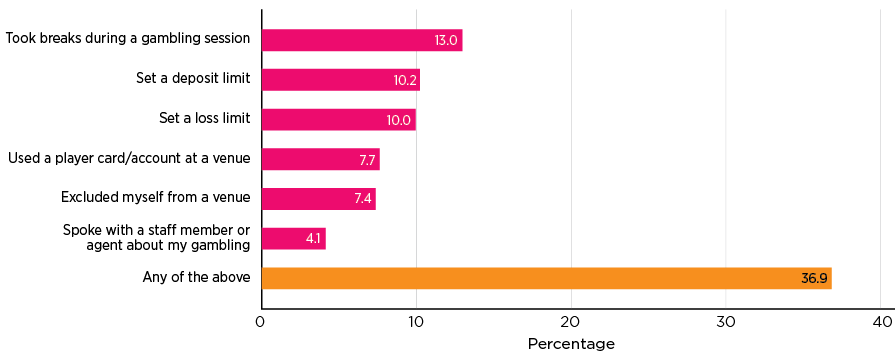
Health and wellbeing
Alcohol use
There was a high prevalence of alcohol use among regular pokies gamblers, with around 4 out of 5 (85.6%) reporting they had consumed alcohol in the past 12 months (see Figure 11). Around 1 in 5 (22.7%) reported drinking 2-3 times a week, and around 1 in 6 (16.0%) reported drinking 4 or more times a week. Based on the Alcohol Use Disorders Identification Test-Concise (AUDIT-C), more than half (60.6%) of regular pokies gamblers were high-risk hazardous drinkers, and the mean expenditure on alcohol in a typical week (reported by 47% of past-year drinkers) was $85.30.
Pokies gamblers at risk of gambling harm (PGSI = 1+) were more likely than those not at risk of gambling harm (PGSI = 0) to: be classified as high-risk hazardous drinkers and spend more on alcohol in a typical week (see Table 4 Dashboard).
Figure 11: Frequency of alcohol use in the past year among regular pokies gamblers

Past-year drinkers were asked about the alcohol use surrounding their most recent pokies session. Of drinkers, more than half (55.6%) reported consuming alcohol either before the pokies session (23.6%), during the session (38%) or after (13%). Of those consuming alcohol surrounding their most recent pokies session, 1 in 4 (25%) reported consuming 2 standard drinks and around 1 in 5 (18.4%) had 3 standard drinks (median total drinks = 3). Another 1 in 5 reported consuming 6 or more standard drinks during their last pokies session (21.5%).
Smoking
Almost half (47.7%) of regular pokies gamblers reported that they were smokers (had smoked in the past year). Around 2 in 5 (41.3%) reported smoking cigarettes or other forms of tobacco, and around 1 in 5 (21.8%) reported using electronic cigarettes or vaporising devices to inhale nicotine.
Smokers were asked about smoking on the day of their most recent pokies session. More than three-quarters reported that they had smoked that day (82.9%). Around two-thirds reported smoking cigarettes or other tobacco (68.2%), and around a quarter reported vaping nicotine (28.5%).
Pokies gamblers at risk of gambling harm (PGSI = 1+) were more likely than those not at risk of gambling harm (PGSI = 0) to: smoke cigarettes or other forms of tobacco, use e-cigarettes or vapes to inhale nicotine and smoke either around their last pokies session (see Table 4 Dashboard).
Mental illness
Probable serious mental illness was identified in 7.1% of regular pokies gamblers, based on the Kessler Psychological Distress Scale (K6). During the past 30 days, around three-quarters of regular pokies gamblers said they felt nervous (78.8%), felt that everything was an effort (75.6%) or felt restless and fidgety (74.6%) at least a little of the time or more often.
Pokies gamblers at risk of gambling harm (PGSI = 1+) were more likely than those not at risk of gambling harm (PGSI = 0) to meet the criteria for probable serious mental illness (8.2% compared to 2.2%).
Dashboard: National gambling trends - regular pokies gamblers
The following dashboard of national gambling trends presents key indicators of gambling participation, risks of harm and harm minimisation behaviour among regular pokies gamblers in Australia (see Table 4). The 2022 figures presented in this inaugural dashboard represent baseline values, which will be compared over time in future annual releases of the NGTS.
| Gambling participation | Total pokies gamblers ( N = 1,016) % | Not at-risk pokies gamblers ( n = 184) % | At-risk pokies gamblers ( n = 832) % |
|---|---|---|---|
| High frequency gambling activities (at least weekly) | |||
| Poker machines or pokies | 61.6 | 44.6 | 65.4* |
| Lotto or lottery games | 37.2 | 43.5 | 35.8 |
| Sports events | 24.5 | 17.9 | 26.0* |
| Horse racing | 22.4 | 17.4 | 23.6 |
| Instant scratch tickets | 17.2 | 16.8 | 17.3 |
| Greyhound racing | 15.0 | 5.4 | 17.1* |
| Keno | 14.5 | 10.3 | 15.4 |
| Harness racing | 12.0 | 5.4 | 13.5* |
| Casino table games | 11.8 | 2.7 | 13.8* |
| Poker | 10.4 | 4.3 | 11.8* |
| Expenditure on gambling | |||
| Total gambling expenditure (all activities) in a typical week (median AUD$) | $200 | $50 | $200* |
| Estimated monthly gambling expenditure (median AUD$) | $1,019 | $406 | $1,283* |
| Payment methods for gambling | |||
| Cash | 82.8 | 78.8 | 83.7 |
| Debit card | 51.9 | 40.8 | 54.3* |
| Credit card | 19.4 | 13.6 | 20.7* |
| Cash advance by credit card | 6.6 | 0.5 | 7.9* |
| Buy now pay later | 3.4 | 0.5 | 4.1* |
| Cryptocurrency | 3.6 | 1.6 | 4.1 |
| Location of gambling on pokies | |||
| At a pokies venue or club | 66.4 | 64.1 | 66.9 |
| In a hotel or pub | 60.0 | 51.6 | 61.9* |
| At a casino | 31.0 | 22.3 | 32.9* |
| Online | 17.4 | 9.8 | 19.1* |
| Online betting accounts | |||
| Have active online betting account/s | 64.4 | 57.6 | 65.9 |
| Mean number of online betting accounts | 2.1 | 0.9 | 2.4* |
Online betting accounts that are offshore (illegal) Yes No Unsure |
63.8 20.2 |
80.2* 12.3 |
17.7 21.7* |
| Illegal online gambling activities | |||
| Online pokies (slots) | 29.7 | 12.0 | 33.7* |
| Online casino-style games | 13.7 | 5.4 | 15.5* |
| Online in-play betting on sport | 12.4 | 9.2 | 13.1 |
| Risk of harm | Total pokies gamblers ( N = 1,016) % | Not at-risk pokies gamblers ( n = 184) % | At-risk pokies gamblers ( n = 832) % |
|---|---|---|---|
| Problem Gambling Severity Index (PGSI) | |||
| At-risk gambling (PGSI≥1) | 81.9 | 0.0 | 100.0 |
| Non-problem gambling (0) | 18.1 | 100.0 | 0.0 |
| Low-risk gambling (1-2) | 13.3 | 0.0 | 100.0 |
| Moderate-risk gambling (3-7) | 23.5 | 0.0 | 100.0 |
| Problem gambling (8-27) | 45.1 | 0.0 | 100.0 |
| Mean score (out of 0-27) | 8.00 | 0.00 | 9.76 |
| Short Gambling Harm Screen (SGHS) | |||
| 1 or more harms | 71.8 | 15.8 | 84.3* |
| Mean score (out of 0-10) | 4.03 | 0.26 | 4.86* |
| Alcohol and other drug use | |||
| Any alcohol use (past 12-months) | 85.6 | 84.2 | 85.9 |
| At least weekly alcohol use | 49.9 | 54.3 | 53.1 |
| High-risk hazardous drinker (AUDIT-C) | 60.6 | 51.1 | 62.7* |
| Mean weekly spend on alcohol (AUD$) | $85.3 | $61.9 | $90.7* |
| Smoke cigarettes/tobacco (past 12-months) | 47.7 | 25.5 | 44.8* |
| E-cigarette/vape use (past 12-months) | 21.8 | 7.1 | 25.0* |
| Harm minimisation | Total pokies gamblers ( N = 1,016) % | Not at-risk pokies gamblers ( n = 184) % | At-risk pokies gamblers ( n = 832) % |
|---|---|---|---|
| Help seeking | |||
| Sought help in past 12 months | 9.2 | 0.0 | 11.2* |
| Wanted to seek help but didn't | 17.6 | 0.0 | 21.2* |
| Actions taken to control money/time spent gambling at a venue | |||
| Took breaks during a gambling session | 13.0 | 5.4 | 14.7* |
| Set a deposit limit | 10.2 | 4.3 | 11.5* |
| Set a loss limit | 10.0 | 3.8 | 11.4* |
| Used a player card/account at a venue | 7.7 | 3.8 | 8.5* |
| Excluded myself from a venue | 7.4 | 1.1 | 8.8* |
| Spoke with a staff member or agent about my gambling | 4.1 | 0.0 | 5.0* |
| Any of the above | 36.9 | 18.5 | 41.0* |
Notes: Total sample of respondents who gambled regularly (at least fortnightly) on pokies in past 3 months = 1,016. Estimated monthly gambling expenditure calculated for 15 gambling activities, excluding financial betting. PGSI: Problem Gambling Severity Index (Ferris & Wynne, 2001). Not at-risk gambling (PGSI score = 0); at-risk gambling (PGSI score = 1+). SGHS: Short Gambling Harm Screen (Browne, Goodwin, & Rockloff, 2018). AUDIT-C: Alcohol Use Disorders Identification Test - Concise (World Health Organization, 2001). *Significantly different at p < .05 level between not at-risk and at-risk pokies gamblers.
References
Browne, M., Goodwin, B. C., Rockloff. M. J. (2018). Validation of the Short Gambling Harm Screen (SGHS): A tool for assessment of harms from gambling. Journal of Gambling Studies, 34(2), 499-512. doi: 10.1007/s10899-017-9698-y
Ferris, J., & Wynne, H. (2001). The Canadian Problem Gambling Index: Final report submitted for the Canadian Centre on Substance Abuse (CCSA). Ottawa: Canadian Centre on Substance Abuse. Retrieved from jogoremoto.pt/docs/extra/TECb6h.pdf
Hing, N., Russell, A. M. T., Browne, M., Rockloff, M., Greer, N., Rawat, V. et al. (2021). The second national study of interactive gambling in Australia (2019-20). Melbourne: Gambling Research Australia. Retrieved from www.gamblingresearch.org.au/sites/default/files/2021-10/Interactive%20Gambling%20Study.pdf
World Health Organization (WHO). (2001). AUDIT: the Alcohol Use Disorders Identification Test. Guidelines for use in primary health care. Geneva: WHO. Retrieved from www.who.int/publications/i/item/WHO-MSD-MSB-01.6a
Media releases
Contributions and acknowledgements
This research was conducted by the Australian Gambling Research Centre (AGRC) team at the Australian Institute of Family Studies: Dr Rebecca Jenkinson, Dr Nancy Greer, Dr Brian Vandenberg, Dr Kei Sakata, Uma Jatkar and Cailem Murray Boyle.
Featured image: © GettyImages/franckreporter
Suggested citation
Greer, N., Jenkinson, R., Vandenberg, B., & Sakata, K. (2023). Regular pokies gambling in Australia, 2022: National Gambling Trends Study. Melbourne: Australian Gambling Research Centre, Australian Institute of Family Studies.
978-1-76016-297-9
Download Research snapshot
Related publications

Regular online betting in Australia, 2022
This research summary presents findings from a 2022 survey of Australian adults who bet online on sports/races (online…
Read more
Consumer views on emerging trends and future directions for…
This research summary presents findings from the 2022 National Gambling Trends Study surveys of Australian adults who…
Read more